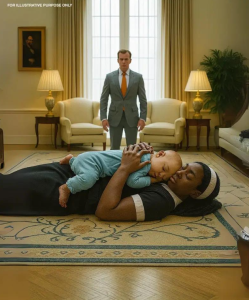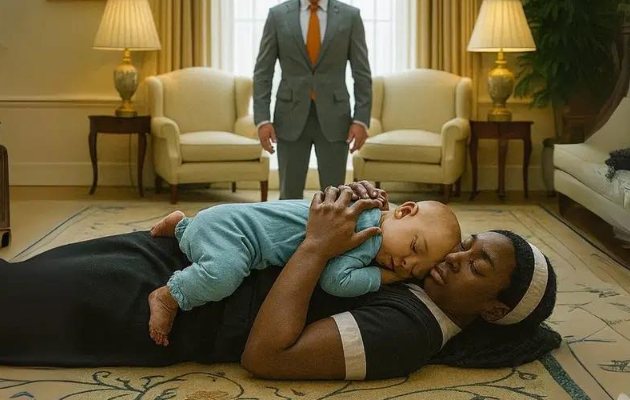
When the billionaire Richard Langford came home that night, the mansion was silent except for the low hum of the central air. He had spent the evening at a board meeting in Manhattan, talking in numbers and strategies, making decisions that would ripple through the economy for years. To him, the world was always about precision, power, and profit. Yet that night, as he stepped into the nursery hallway, something made him stop.
A faint glow slipped out from beneath the door of his son’s room.
He pushed it open quietly.
There, on the carpeted floor near the crib, lay the maid—Amara. Her dark skin was faintly illuminated by the soft lamp beside the baby’s cradle. She was curled on her side, one arm gently draped over the edge of the crib as if guarding the child. His son, baby Oliver, slept peacefully, his tiny fingers wrapped around one of hers.
Richard frowned at first. Sleeping on the floor? That wasn’t part of her duties. She had a small servant’s room in the basement. But before he could speak, he noticed the expression on her face. Exhaustion. Tenderness. And something else — a kind of fierce protectiveness.
He glanced at the clock. It was past midnight.
Instead of waking her, he leaned quietly against the doorframe and watched. The air smelled faintly of baby powder and milk. There was a bottle, half-empty, on the table. The rocking chair nearby had been moved closer to the crib.
It looked as though Amara had stayed up feeding Oliver and simply drifted off while watching over him.
For a moment, Richard’s heart softened. He was not used to such scenes. His late wife, Julia, had been the light of the house, but since her death, everything had turned mechanical — nannies, schedules, assistants, and lists. He had hired Amara three months earlier through an agency. She had been quiet, efficient, never once late, and always polite.
He took a step closer. Then, as he did, the baby stirred and whimpered softly.
Amara’s eyes fluttered open instantly. She sat up quickly, her expression startled until she saw it was him.
“Mr. Langford,” she whispered, quickly standing. “I’m so sorry. I didn’t mean to—”
“Shh,” he interrupted gently, raising a hand. “It’s alright. He was crying?”
“Yes, sir,” she said, her voice still trembling. “He wouldn’t sleep. He missed… well, I think he missed his mother. I sang to him until he calmed down.”
Richard nodded slowly. “You did well.”
Amara blinked, clearly not expecting kindness. “Thank you, sir. I’ll go now.”
But before she could leave, Oliver stirred again. This time, he reached toward her, whimpering softly. Without thinking, Amara knelt and hummed a few low notes. The baby relaxed instantly, his small face melting back into sleep.
Richard stood frozen. His son had never done that — not for him, not for the nurses, not for anyone. Only for her.
Something stirred in him then, something he hadn’t felt in years — the ache of memory, the pulse of something deeply human.
“Amara,” he said quietly. “Sit down for a moment.”
She hesitated but obeyed. Her posture was stiff, her eyes lowered.
“How long have you worked as a maid?” he asked after a pause.
“Since I was sixteen, sir,” she replied. “Back home, in Johannesburg first, and then here.”
“And the agency treats you fairly?”
A shadow crossed her face. “They take most of my pay, but… it’s better than nothing. I send what’s left to my mother and my younger brothers.”
Richard exhaled. His fortune could feed her entire village for decades, and yet here she was — sleeping on the floor beside his child.
He studied her hands, the small scars from years of work. Then his gaze drifted to the baby’s peaceful face. Something clicked quietly inside him.
“Amara,” he said after a long silence, “starting tomorrow, you won’t be working through that agency anymore. I’ll hire you directly — at triple your current pay. You’ll have proper quarters upstairs, next to Oliver’s room.”
Her mouth opened slightly. “Sir, I… I don’t know what to say.”
“Say yes,” he replied simply.
Tears filled her eyes, but she quickly wiped them away. “Yes, sir. Thank you. Truly.”
Richard nodded once and turned to leave, but as he reached the door, she spoke again — softly.
“Mr. Langford?”
He looked back.
“I know what it’s like to lose someone,” she said. “Sometimes love doesn’t vanish. It just… changes its shape.”
He met her gaze then. It was steady, kind, and without fear. For a man who lived surrounded by power, he suddenly felt very small.
That night, he didn’t go to his study as usual. He went to the living room, sat on the couch, and for the first time in years, he looked at the framed photograph of his late wife without turning it face-down.
The next morning, something shifted in the mansion.
Amara moved into her new quarters. She decorated Oliver’s nursery with color, filled it with laughter and lullabies. Richard began spending time with them — brief moments at first, then longer ones. He would come home early, finding Amara reading softly while Oliver slept on her lap.
Weeks passed. The house began to feel alive again.
Then one afternoon, as rain streaked the tall windows, Richard found Amara standing by the piano in the sitting room. She was humming, and the melody tugged at something deep in him.
“What song is that?” he asked.
“It’s a lullaby from my village,” she said, smiling. “My mother used to sing it whenever storms came.”
He nodded slowly. “It’s beautiful.”
She looked down, shyly. “Music makes children feel safe. Even grown-ups too, I think.”
And for the first time in years, Richard smiled — not the polite kind, but the kind that reached his eyes.
Months later, when the baby turned one, the household gathered for a small celebration. Amara stood at Richard’s side, holding Oliver as he reached for the cake. In the laughter that filled the room, Richard realized something extraordinary had occurred.
What had begun as a moment of silent observation — a billionaire finding his maid asleep on the nursery floor — had become the moment that reshaped his life.
He had found not just someone who cared for his son, but someone who reminded him that compassion is worth more than any fortune

